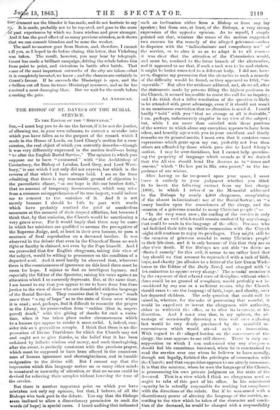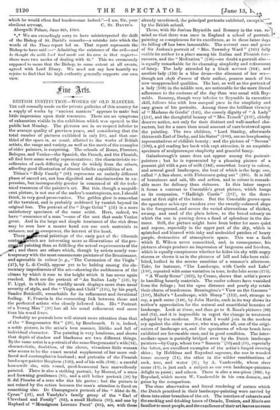THE BISHOP OF ST. DAVID'S ON THE BURIAL SERVICE.
To THE EDITOR OF THE "SPECTATOR."
Sto,—I must beg you to do me the favour, if it be not the justice, of allowing me, in your own columns, to correct a mistake into which you have fallen as to the purport of the remark which I made in the House of Lords, on Lord Ebury's motion for a com- mission, the real object of which you correctly describe—though it was very differently expressed in the motion itself—as being " to alter the English Burial Service." The opinion in which you suppose me to have " concurred " with "the Archbishop of Canterbury, the Bishop of London, Lord Grey, and Lord West- bury," is one which I not only did not express, but which is the reverse of that which I have always held. I am so far from admitting that there is any reasonable ground of objection to the parenthetic clause, "as our hope is this our brother cloth," that no amount of temporary inconvenience, which may arise from a common misapprehension of its true import, would induce me to consent to the omission of it. And it is not merely because I should be loth to part with words which have probably soothed the grief of numberless mourners at the moment of their deepest affliction, but because I think that, by that omission, the Church would be sanctioning a very grave error. For it would imply that there may be cases in which her ministers are qualified to assume the prerogative of the Supreme Judge, and, at least in their own bosoms, to pass a sentence of final reprobation on a deceased brother. It was observed in the debate that even in the Church of Rome no such right or faculty is claimed, not even by the Pope himself. And I am persuaded that few English clergymen, taking this view of the subject, would he willing to pronounce on the condition of a departed soul. And it need hardly be observed that, wherever there is the consciousness of ignorance on this head there must be room for hope. I rejoice to find an intelligent layman, and especially time Editor of the Spectator, raising his voice against an alteration which I so earnestly deprecate. But, at the same time, I am bound to say that you appear to me to have done less than justice to the view of those who are dissatisfied with the language of the Burial Service. They conceive that it "expresses" much more than " a ray of hope" as to the state of those over whom it is read ; and, perhaps, find it difficult to reconcile the prayer in the Litany, for preservation from " sudden (that is, unpre- pared) death," with the giving of thanks for such a visita- tion, when it has taken place under circumstances which to a human eye appear to render it most awful. I, indeed, con- sider this as a groundless scruple. I think that there is no dis- pensation of Divine Providence for which the Church may not and ought not to give thanks, in the belief that it has been ordained by infinite wisdom and mercy, and such thanksgiving, after the event, is perfectly consistent with the previous prayer, which must be supposed to have been offered in the conscious- ness of human ignorance and shortsightedness, and in humble resignation to the divine will. But I cannot say that the impression which this language makes on so many other minds is unnatural or unworthy of attention, or that no means could be devised for relieving their scruples without lowering the tone of the service.
But there is another important point on which you have mistaken not only my opinion, but that, I believe, of all the Bishops who took part in the debate. You say that the Bishops seem inclined to allow a discretionary permission to omit the words (of hope) in special cases. I beard nothing that intimated
such an inclination either from a Bishop or from any lay speaker; but from one, at least, of the Bishops, a very strong expression of the opposite opinion. As to myself, 1 simply pointed out that, whereas the terms of the motion suggested two courses for the remedy of the alleged grievance—either to dispense with the "indiscriminate and compulsory use of time service, or to alter it so as to adapt it to all cases— it was clear that the attention of the Commission would, and must be, confined to the latter branch of the alternative, and it appeared to me that, if such a task was to be undertaken, it might be better entrusted to a differeut body. I did not, how- ever, disguise my persuasion that the obstacles to such a remedy of the difficulty would be found, as they appeared in 1851, "it- superable." But after the evidence adduced, and, above all, after the statements made by persons filling the highest positions in the Church, it seemed impossible to resist the call for an inquiry ; and I do think that a fuller ventilation of the question is likely to be attended with great advantage, even if it should not result in art unanimous conviction that no alteration is needed. I could hardly " hold " with you " that no change at all is desirable."
am, perhaps, unfortunately singular in my view of the subject ; but, while I sin more than satisfied with those portions of the service to which alone any exception appears to have been taken, and heartily agree with you in your excellent and timely remarks on its general merits, I must own that it contains sonic expressions which grate span my ear, prob thly not less than others are offended by those which gave rise to Lord I' Bury's motion. I m ty be over-fastidious, but I cannot help question- ing the propriety of language which sounds as if we desired that the All vise should bend His decrees as to " times and seasons," which He has put in His own power," to the im- patience of our wishes.
After having so far trespassed upon your space, I must leave it entirely to your judgment whether you think fit to insert the folio sing extract frommy last charge (1860), in which I referred to the Memorial addressed to the Bishops by nearly 4,000 clergymen, complaining of the almost indiscrirninate use of the Burial Sorvic-s as "tt heavy burden upon the consciences of the clergy, anti the occasion of a grievous scandal to many Christian people :" —
"In the very worst case', the reading of the service is only the sign of an evil which would remain unabated by any change that could be made in the language of the office. Pereons who lad forfeited their title to visible communion with the Church 'night still continue to enjoy its privileges. They might still be
• the occasion of grievous scandal to many Christian people' in their life-time, and it is only because of this that they are so after their death. If the Bishops arc not able 'to dovisi an effectu tl remedy' for this evil, it seems to me rather bard that hey should on that account be reproached with a lack of faith, hope, and charity [an allusion to a letter of the late Canon Wodc- house to the Editor of the Daily News]. and charged with determination to oppose every change.' Phe scandal occasioned by the exposure of that relaxed state of discipline, without which there could be.no ground of complaint, would probably not ho considered by any one as a sufficient re son \viler the Church should cease t t use the language of faith, hope, and charity, over
her departed children. The only question that could well he raised is, whether, for time sake of preventing that scandal, it would be expcd eat to invest the clergymen with authority, either to withhold the office, or to alter its litegivs.;e, at his
discretion. Amid I must own that, in my opinion, the ad- vantage of occasionally throwing a thin veil over a glaring fact would be very dearly purchased by the manifold in- conveniences which would attend stud, an innovation. With regard to th alleged burden on the consciences or the clergy. the case appears to me still clearer. There is only on supposition on which I can understand why any clergymen should feel his conscience burdened, when he is constrained to read the service over one whom he believes to have morally, though not legally, forfeited the privileges of commimuion with the Church; and that supposition appears to me utterly erroneous. It is that the minister, when he uses the language of the Church, is pronouncing his own private judgment on the state of the deceased. That is a view which I think no clergyman need or ought to take of this part of his office. In his ministerial capacity he is actually responsible for nothing but compliance with the directions of the rubric. But if he woe armed with a discretionary power of altering the language of time service, ac- cording to time view which he takes of time character and condi- tion of the deceased, lie would be charged with a responsibility
which be would often find burdensome indeed."-I am, Sir, your
obedient servant, C. ST. DAVID'S. Abergwili Palace, June 8th, 1863.
*** We are exceedingly sorry to have misinterpreted the drift of. the Bishop of St. David's remarks-a mistake into which the words of the Times report led us. That report represents the Bishop to have said :-" Admitting the existence of the evil-and he thought the noble lord had made out his case in that respect- there were two modes of dealing with sit." This we erroneously supposed to mean that the Bishop, to some extent at all events, agreed with Lord Ebury. We need not say how heartily we rejoice to find that his high authority generally supports our own view.































 Previous page
Previous page